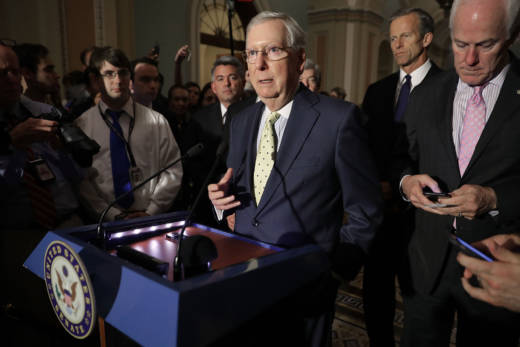Big Changes to Medicaid
Some of the biggest changes this bill makes are to Medicaid, the entitlement program that provides health care to low-income Americans. In that sense, it looks like the House bill, which the CBO said would cut Medicaid by $834 billion over a decade (relative to current law), with a loss of 14 million beneficiaries.
Both bills roll back a Medicaid expansion undertaken under the Affordable Care Act. That law extended the program to some low-income Americans above the poverty level. The Senate proposal would roll back that expansion, though it would do so more slowly than the House bill proposes.
As with the House, the Senate also proposes giving states either a per capita cap on Medicaid spending or a block grant of funds. That's a fundamental change; currently the program is "open-ended," meaning funding increases as need increases.
But there's another change on top of that. Those caps would vary based on the rate of inflation, and the inflation rate the Senate would attach to those caps is one that is lower than the inflation rate the House attached.
That might sound like a minor wonky change, but it's not, says one former Medicaid administrator.
"That's a big deal. It's a big shift," said John Corlett, president of the Center for Community Solutions who also served as a director of Ohio's Medicaid program. "It means billions of dollars less in federal aid to states for their Medicaid programs."
Tax Cuts for Richer Americans
The Senate bill is also much like the House bill in that it would repeal most of the taxes associated with Obamacare. (It would bump out the implementation of the so-called "Cadillac Tax" on expensive, employer-sponsored health care plans, from 2025 to 2026.)
Repealing those taxes, as the Tax Policy Center reported in May (regarding the AHCA), would overwhelmingly benefit higher-income Americans. The taxes in Obamacare were largely progressive, as Kyle Pomerleau of the right-leaning Tax Foundation told NPR.
To one health policy expert, those tax cuts, combined with the cuts to Medicaid, mean the bill isn't a health care overhaul.
"It is a tax cut bill, and they had to find a way to finance it, and Medicaid beneficiaries are going to be the ones who hurt," said Nicholas Bagley, a University of Michigan Law School professor who specializes in health law.
There are a few other ways the Senate bill mirrors the House bill. It bans the use of any federal funds for any health care plan that covers abortion, except in the cases of rape, incest or where the pregnancy puts the mother's life in danger.
As of 2020, the bill also eliminates cost-sharing subsidies that help low-income Americans pay for their insurance.
But it also has some key differences from the House bill. For example, it cuts the upper-income limit that determines who gets premium tax credits. Currently, that upper limit is at 400 percent of the poverty level. This bill would limit that to 350 percent.
The Senate's proposal allows states substantial freedom in determining their own health care programs — even more freedom than the House bill allows for. Under the Affordable Care Act, states can apply for "innovation waivers" exempting them from parts of the law and allowing them to determine their own health care systems, to an extent.
However, there are strict rules in place stating that states getting those waivers must provide coverage that is "at least as comprehensive" as they would be otherwise, as the Centers for Medicare and Medicaid Services explains.
The Senate proposal greatly widens that loophole, saying that states can get those waivers, provided their alternate plans simply don't grow the deficit.

9(MDAxOTAwOTE4MDEyMTkxMDAzNjczZDljZA004))